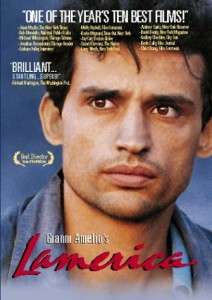Lamerica
| Lamerica | |
|---|---|
 | |
| Directed by | Gianni Amelio |
| Produced by | Mario Cecchi Gori |
| Written by |
Gianni Amelio, Andrea Porporati, Alessandro Sermoneta |
| Starring |
Enrico Lo Verso Michele Placido Piro Milkani Carmelo Di Mazzarelli Elida Janushi Sefer Pema Idajet Sejdia Marieta Ljarja |
| Music by | Franco Piersanti |
| Edited by | Simona Paggi |
| Distributed by | New Yorker Films |
Release dates |
|
Running time | 116 minutes |
| Country | Italy |
| Language | Italian, Albanian |
Lamerica is a 1994 Italian drama film directed by Gianni Amelio. It entered the competition at the 51st Venice International Film Festival, in which Amelio won the Golden Osella for Best Director.[1] The film was selected as the Italian entry for the Best Foreign Language Film at the 67th Academy Awards, but was not accepted as a nominee.[2]
Plot
Gino (played by Enrico Lo Verso) and Fiore (Michele Placido) are Italian racketeers who come to Albania just after the fall of communism to set up a fictive firm and pocket the grants.
They need a stooge and choose Spiro Tozaj/Michele Talarico (Carmelo Di Mazzarelli), an old man in a prison, who turns out to be an Italian veteran from World War II. Easily confused and utterly impoverished, this elderly former political prisoner seems the perfect choice, until he unexpectedly disappears.
Gino is assigned to find him, setting out on a journey that leads him to discover Spiro's tragic personal history and become intimately acquainted with the full extent of Albanian poverty. Gino's car tires are stolen, while the fancy shoes he gave Spiro are also stolen by children.
Gino and Spiro follow a group of Albanians who are headed for Italy in search for a better life, first by truck and later by ship. The Albanian exodus parallels that of Italians for the United States, which is where Spiro believes that they are heading.
Awards
- 1994 European Film Awards – "Best Film"
- 1994 Venice Film Festival – 4 Awards including "Best Director"
- 1995 São Paulo International Film Festival – "Critics Award"
- 1995 David di Donatello: Best Cinematography, Best Score, Best Sound
- 1995 Nastro d'Argento: Best Director, Best Cinematography
- 1996 Goya Awards – Best European Film
Critical and scholarly reception
In the film, Spiro Toiza rediscovers his Italian identity of Michele and at the end of the film believes the boat is headed to New York, while on the other hand Gino loses all materialistic indications that he's Italian and comes to look like another Albanian in a boat full of them. These two plot threads "challenge Italy's colonial past and in so doing force the redefinition of the notion of identity. Who is Italian? And what does it mean to be Italian?"[3]
TV Guide gives the film four stars, finding it "A boldly chilling portrait of post-Communist Europe in moral eclipse, directed with passion and singular grace by Italian Gianni Amelio (STOLEN CHILDREN)."[4] Janet Maslin, writing for The New York Times, finds that "The film's synthesis of fact and fiction is gracefully achieved," and expressed hope that after the screening of Lamerica at the 1995 New York Film Festival, Amelio would "emerge ... much more widely known."[5]
See also
- Tirana Year Zero
- Albanian diaspora
- Movies about immigration to Italy
- List of submissions to the 67th Academy Awards for Best Foreign Language Film
- List of Italian submissions for the Academy Award for Best Foreign Language Film
References
- ↑ Edoardo Pittalis, Roberto Pugliese, Bella di Notte, August 1996.
- ↑ Margaret Herrick Library, Academy of Motion Picture Arts and Sciences
- ↑ Luca Caminati, "The return of history: Gianni Amelio's Lamerica, memory, and national identity" Italica 83.3-4 (Fall - Winter 2006): 596
- ↑ Staff, "Lamerica: Review" TV Guide Accessed Jan. 14, 2008
- ↑ Janet Maslin, "Film Festival Review; Scheming Italians In Troubled Albania" The New York Times October 4, 1995
External links
- Lamerica at the Internet Movie Database
| Awards | ||
|---|---|---|
| Preceded by Urga (Close to Eden) |
European Film Award for Best European Film 1994 |
Succeeded by Land and Freedom |